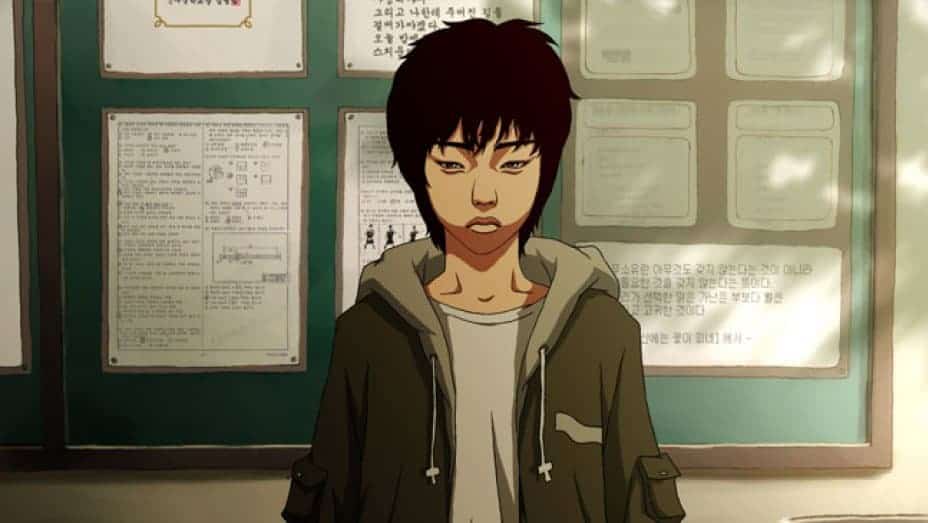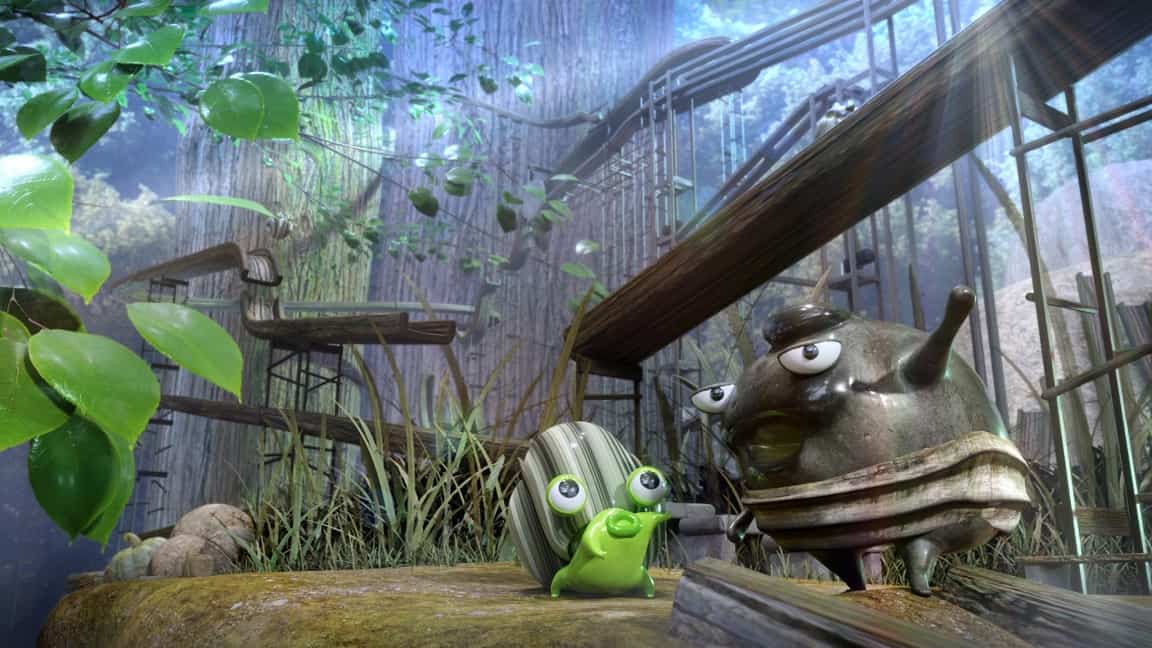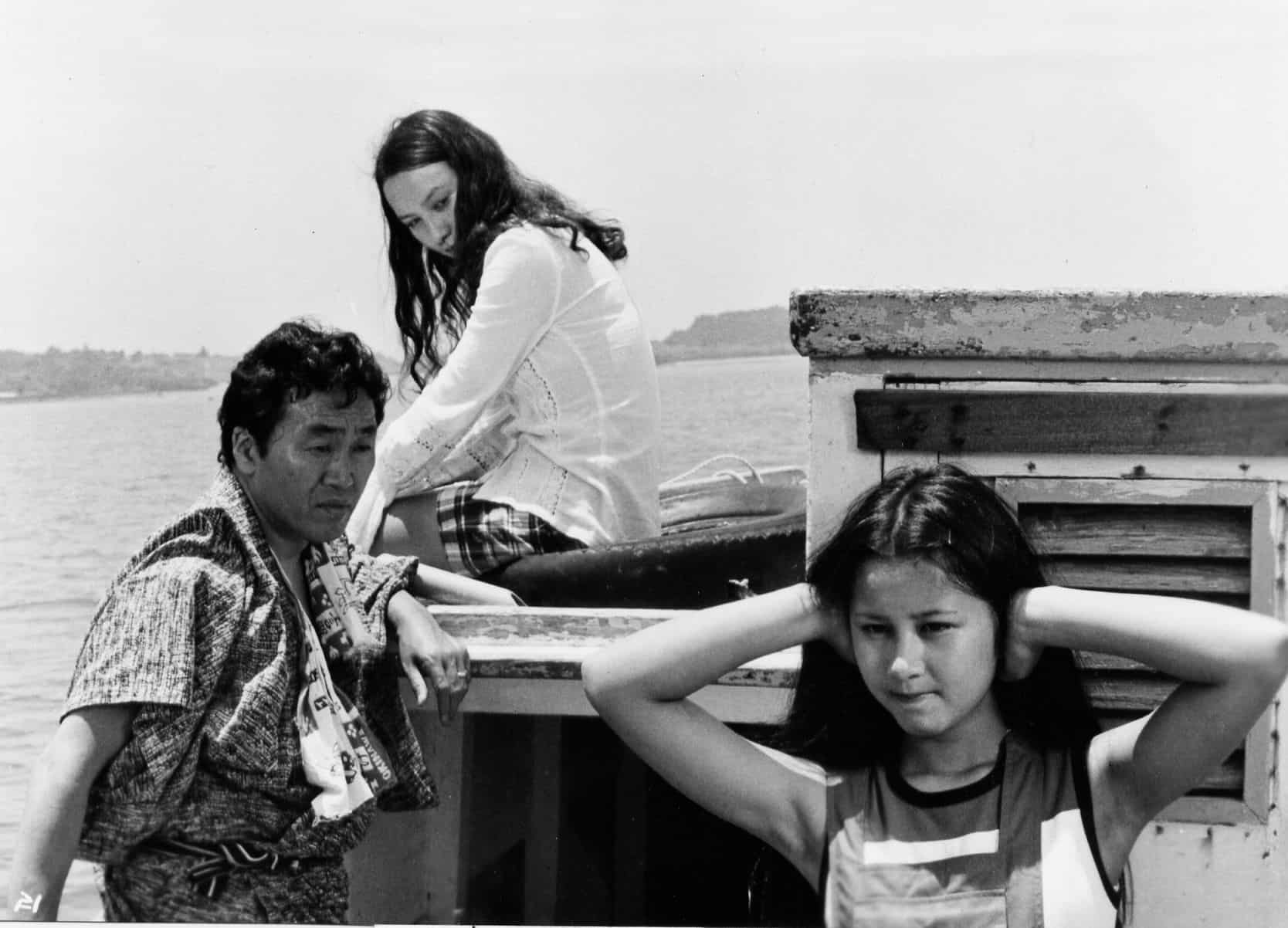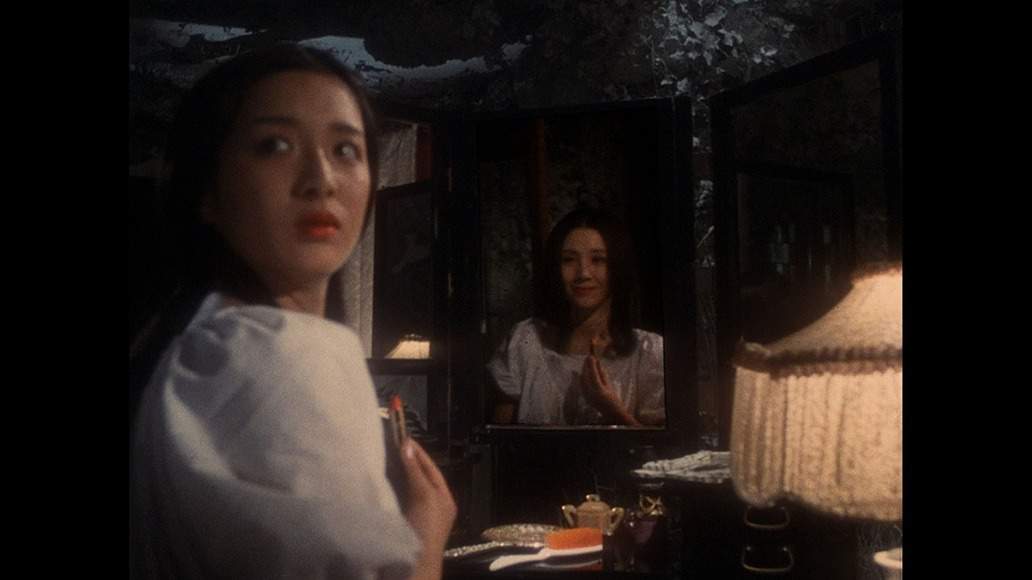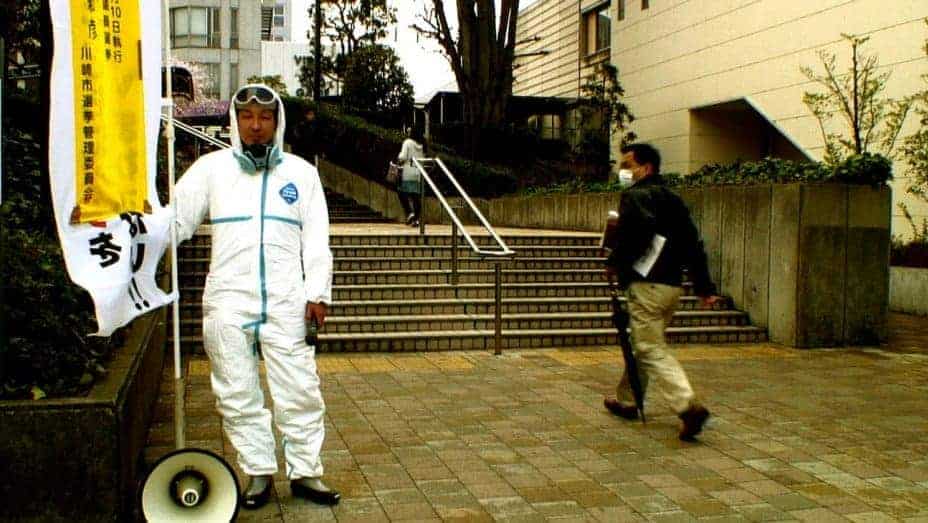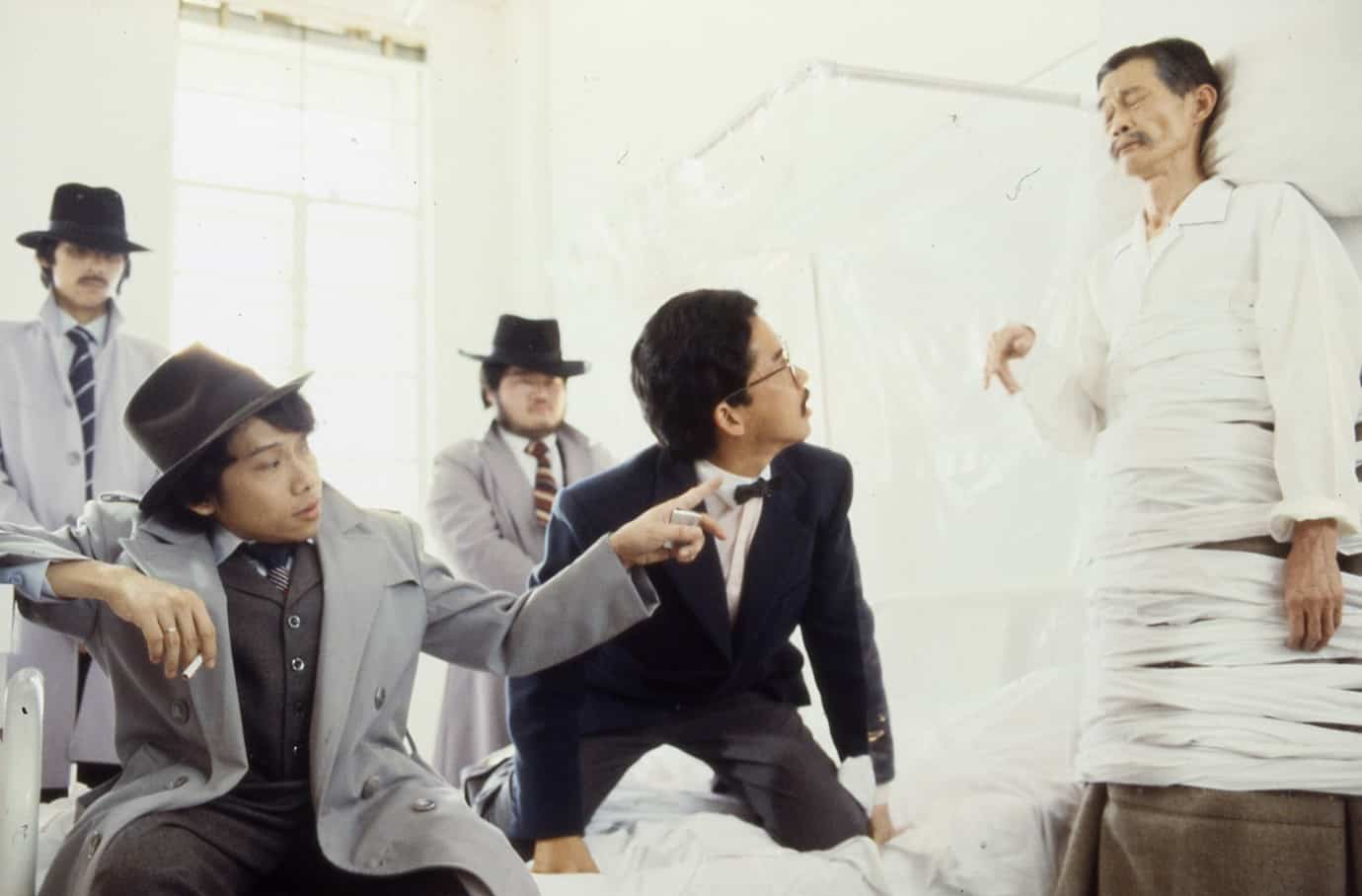Drab Rooms and Drab Factories
At the plant nursery, Michi squats down with a clipboard, stock checking. Large shrubs are covered in clear sheets, framing the edge of the screen, acting like a curtain. This focuses the line of sight on Michi, squatting down, alone. A melancholy compositional shot enhancing Michi's isolation, even at work. Toshio Yabe appears emotionless and walks into the into the back room office, in an awkward robotic manner. As Michi tries to converse with him, the boss calls her, asking her to move some orchids. The boss is enigmatically played by Shun Sugata. She asks the boss his opinion of Toshio's behaviour, and he answers her in an unusual fashion.
The Boss Words said in friendship with the best intentions…
Always wind up hurting your friends deeply.
And then you wind up getting hurt
Is friendship always that way?
If that's so, what's left?
Kiyoshi Kurosawa creates another alienating composition shot. The boss sits down in a concrete corner, with wire fence all around, a grey urban landscape in the background. Cornered in loneliness, he's gone beyond existential crisis and unleashes nihilist scepticism! This is the plant nursery boss's only speech in the film and it is so cynical, you could butter your bread with it. The director works a clever juxtaposition, as the boss says it all in a light, witty manner, with a wry smile on his face. He's already gone beyond human interaction, and he's content with his desolation; he'll keep to his plants! .
Michi is whipped by plastic sheeting, flapping in the wind, a heavy weight bearing down, and concrete everywhere She confronts Toshio Yabe in the drab storeroom, boxes dropping on his head. He explains that he saw a horrible face, unlike anything he's ever seen. He warns her of ‘The Forbidden Room'. A close up of their faces, Toshio in profile, Michi in portrait, neither looks at one another, both communicating, but with no connection. Michi asks if it is the room with the red tape. Toshio become extremely agitated and makes eye connection, warning her not to go in there. He is now in real distress, hyperventilating, shuddering. Michi tries to find out what went on in the room, but Toshio can only say he is cold. Michi rushes off to get a blanket, but he walks away.
In the drab urban purgatory, Michi is looking at the door with red sealed tape. There is still a random white chair next to it. She walks into a dull, grey industrial area; dreariness is supreme, a black van drives past her, a harbinger of death! A woman stands on top of big industrial tower silo, Michi taps out a text message on her phone. Michi turns around to see the woman, dressed in red and pink, dive off the tower! She belly flops horizontally to her death! Michi shrinks into herself, suicide everywhere! She crumples as a few curious people finally appear, but no one makes a move towards the suicide!
This is quite a striking cut of cinema, as the jump, dive and splat are all done in one take. If special effects, a dummy or an insane stuntmen/stuntwoman are used, I don't know, but this is a beautifully shot scene. The initial detached documentary feel, shifts into anguish and tragedy, all made possible by Kumiko Aso's acting ability. The whole crew work in unison to capture this artful but troubling scene. The industrial setting creates an intensely alienating atmosphere, all masterfully directed by Kiyoshi Kurosawa.
The Oozing!
Ryosuke is at University, lounging around, listening to music. He walks through the library, about to exit, when he decides to turn back and wonder around the book shelves. A robotic young woman pushes a library trolley in the background! He bumps into Harue, who is reading a book on phantoms, not exactly computer science, but she says it relates to her work in the lab! She asks if he's a got a minute, he jogs after her, like a puppy. They are back at the computer simulation with the blobs and dots, as strange things are happening to the simulation. The blobs and dots are flickering, appearing and disappearing, getting blurry, just like ghosts! She doesn't understand why these strange blobs are appearing in the program, and it is not a bug in the system. Though she's not fully followed up on the nature of Ryosuke websites and video streams, she is sure that the two issues are related. She carries on busying herself with her tasks, as if trying to forget. Another post-graduate student appears and she has to get on with her work. As he walks off, Harue runs up to him with her phone number, much to his surprise.
Unusually for Ryosuke, he goes to the library to research ghosts! Economics has been trashed; there are more pressing matters! The book poses the question; how many ghosts have existed since pre-historic times? It is the same tome Harue was reading. At the corner of his eye Ryosuke notices something odd, a shady shape of a boy in the library, watching him. The post-graduate student that Harue works with, Yoshizaki, appears. Ryosuke asks if he sees the shape. The student nonchalantly replies that he sees it, and Ryosuke will have to catch it to find out what it is! The post-graduate student eggs him on to chase the mysterious figure. Ryosuke charges after the shade, venturing where angels fear to tread, eerie sopranos wailing in the background! The shade disappears. This is a fine student prank that could have gone spectacularly existential! Kiyoshi Kurosawa's dry humour is highlighted in this scene, playing around the ‘boys will be boys' cliché. This is a classic of the horror genre, usually ending with something horrible happening. Kiyoshi Kurosawa challenges this, with the stylish Yoshizaki apologising, and inviting Ryosuke for tea!
They philosophise about the uncanny controversies that are occurring. The computer scientists have become experts in ghosts! He considers that the spirit/consciousness/soul inhabits a realm of finite capacity. That realm may accommodate millions or trillions of these entities, but eventually it will run out of space. Once it is filled it has to overflow somewhere. Yoshizaki hypothesizes that souls will ooze into material reality, once that realm reaches critical mass. Any device at hand will help in this incursion of souls. The invention of modern technology is making the incursion easier.
The scene shifts to a cameo by Sho Aikawa, a familiar face from many Takashi Miike and Kiyoshi Kurosawa films. His character's face is at a window of an ever darkening room. He is a worker at a rubble strewn demolition site and asks for some tape. A builder gives him some red tape for which he is grateful. He goes off to seal up the now boarded up window and then he seals the door.
In the darkened room, with a sickly yellowy light, a shade shudders and jerks into sight. At the very moment of incarnation, the sealed door is smashed by a big industrial digger, the building is being demolished. Sho Aikawa's character looks on, as the sealed window is smashed to pieces, but with wires everywhere. The demolition of this ship yard, and its spaghetti mass of wires, demonstrates Yoshazaki's point. The materials are at hand for the shades to move osmotically into reality and spread around the world!
The scene shifts back to the two students. Yoshizaki considers that the spirits are no longer a faint presence, and Ryosuke has already seen one. Ryosuke is not convinced. He's somewhat annoyed, but Yoshizaki gives him one more unpleasant hypothesis. There is no turning back; no matter how simple the device, once the system is complete, it will function on its own, permanently. The conduit between the realms is complete.
The Forbidden Room
The plant nursery boss is now seen to be sealing up many windows! Michi and Junco are at work but they can't find the boss, so they are phoning around, trying to find him. Junco is freaked out that people are disappearing and declares she is off to find the boss. Michi is about to go after her, when the phone rings. A slow cold voice intones, ‘help me', she thinks it is Toshio Yabe, and she goes to find him in the back office. He is standing against the back wall, like a statue, a grey hue draped over the room by the cinematographer Junichiro Hayashi. Michi is overjoyed to see him, but after a few steps, he evaporates and only an outline of a black stain is left on the wall! A voice calls out ‘help, help me'. She leaves the room and closes the door. The black stain is outlined, cold against the dingy wall! Light and plants briefly frame Michi, giving her a brief respite, but Junco has disappeared. This is an incredibly melancholy scene, but Michi is almost taking tragedy in her stride.
Junco is at a door unsealing the red tape around it. Her desperation and lack of understanding of the shifting situation is becoming dangerous. Innocent and in her red dress, she walks into ‘The Forbidden Room'! Michi dashes to the boss's apartment and sees the red tape on the open door; she rushes through the door in panic. Junco is crawling round on the floor in great distress. Michi tries to haul her out of ‘The Forbidden Room', but an apparition is in the corner, black as hell! The shade, its hair swirling, medusa style, encloses Junco, enveloping her with the stare of nothingness; a nerve shredding scene. Michi, the ingénue, has toughened up! She faces down the shade, and rescues her friend Junco. They run for it! This is a fine scene full of chills and nerve shredding music. The sheer creepiness of Kiyoshi Kurosawa direction is excellent.
Junco is shrouded in a white sheet, asleep in bed. Michi is resting up in a chair, exhausted. Junco is all in white, knees up to her chest in state of agitation and anguish, repeating ‘help me'! Michi does her best to comfort her, but she needs to go to the shop for supplies. The shop is completely empty and no one is at the counter. She notices a shadowy shape in the backroom, and makes a hasty retreat with her provisions. She's not paying a ghost!
The Monitors of Morbidity
Ryosuke rings Harue, but there is no answer. He leaves his concrete encased apartment building and runs toward the imposing urban concrete metropolis; there is not a soul to be seen, and the spirit itself is sucked out through the alienating architecture! A concrete hue imbues the light itself, cleverly photographed by Junichiro Hayashi. The computer lab is empty, apart from wires dangling everywhere, an infection of disorder infiltrates this formerly tidy lab. A chair on wheels randomly rolls across the floor. On a laptop screen, the figure of a man keeps appearing and disappearing, constantly repeating, walking across a room, going nowhere. Strangeness multiplying!
Ryosuke tries Harue's apartment, but with no success. It is another grey concrete enclosed corridor, drab to the extreme! A figure shuffles up the stairs, it is Harue! She is dressed all in white and she is soaking wet. Harue rambles that everyone is disappearing, she desires to run away. Panic seizes her, but Ryosuke calms her. In her book laden apartment, befitting a young developing intellectual, Ryosuke, our slightly foolish protagonist, makes her a drink and she regains her composure. A kind of rationality returns, but her conversation with Ryosuke is morbid and abnormal. She says she's been obsessed with death since she was a child, she has always been alone! Ryosuke asks if she has parents, which she has, but she says they are ‘irrelevant'! This unnerves Ryosuke and he attempts to steer the conversation away from the saturnine, but Harue has a need to sound off. She once considered that the afterlife might be a big jamboree, until high school, when it dawned on her, death might be the ultimate isolation. The idea is utterly horrifying, her alienation would continue into the afterlife, forever! Harue is an unhappy and lonely woman, with a disturbed inner life. Her breezy, busy personality is a performance to mask her sadness. Ryosuke is dismayed at such thinking! He announces that they should be proud that they are alive! Harue switches on a horde of monitor screens filled with figures in grotesque desperation. She asks Ryosuke what this all means.
Harue In fact… ghosts and people are the same…
Whether they're dead or alive.
Ryosuke goes all out for positive existentialism, giving the ghosts the middle finger and he celebrates the fact he is alive. Ryosuke goes one step further, pronouncing that a drug maybe invented to prevent death and they could be immortal! Ryosuke likes his lazy ways, though he's certainly more enthused about his existence now that the beautiful Harue is in his life. He now wants to live forever! Harue considers immortality possible, but in a pessimistic vein. A ghost won't want to kill to make more ghosts; they'll try to make people immortal.
Harue By quietly…trapping them in their own loneliness
At the grey factory, where the woman committed suicide, a black stain is on the floor. ‘Help me' wafts on the wind. This is a desolate short scene by Kiyoshi Kurosawa, tremendously sad. There are no people around to hear her disembodied, desperate voice! Loneliness reigns supreme in this alienating industrial purgatory.
Everything Is Dust
Michi is trying to feed Junco; she is covered in a white blanket, completely lost in own self. Food drips from her mouth, like a baby. Michi affectionately wipes her face. When Michi cleans the dishes, Junco seems to have lost the use of her voice. She resorts to whines, whimpers and grunts. She stretches her arms out like a child, distraught that Michi has left her, desperate for her to return. Michi runs to comfort her and Junco grabs hold of her for dear life. Exhausted, Michi finally sleeps. When she awakens, Junco is fully dressed looking out of the window, white curtains billowing with the breeze. She turns around, with an emotionless look and asks if she is going to die like this.
Junco I'll just keep on living, all alone…
Junco stands by the wall, as Michi makes coffee. Michi turns around and there is a black stain on the wall! Michi goes through a gamut of emotions from shock, sadness and then to desperate denial as she looks for her friend, all superbly acted by Kumiko Aso. The black stain transmutes to ash and a gust of wind blows the dust away. Junco is lost to eternity. Michi can only wonder why!? Junco's disembodied voice wails on the breeze, her ash dissipating. This is another unbearably sad scene, Kiyoshi Kurosawa amassing the melancholic tragedy. The existential dread of loneliness has turned poor Junco to dust!
Michi is in a state of tragedy fatigue, looking out into nothing. She decides to try ring her mother. Someone picks up, but there's no answer. Michi's day is a gift that keeps on giving!
On The Train To Desolation
Ryosuke is in his favourite arcade wasting coin again, but this time it is empty. There is no one at the slots, nobody is blasting away at the arcade games, but the noises of the amusements play on regardless. He rings a bell for an assistant; a ghost walks by in the background. As he turns around, he perceives a ghost walking through the arcade. Not quite the customer service he's expecting! He follows it's jerking black blurry shape, but it starts to turn towards him. The noises of amusements continue as if nothing is happening. Ryosuke runs off. Modern convenience entertainment is now a hotspot for ghosts! Watch out if you are playing Space Invaders, you might get more than you bargained for. This is another witty scary scene. Even if you want to gamble away your money on the slots, you might be confronted with a dark night of the soul incident!
As Ryosuke runs back to his apartment, he meets a downtrodden Harue. She wants to go wherever he is going; she doesn't want to be alone. He agrees and they run! A random white chair is situated next to a door!
At the train station, everything is out of order and the place is empty. They jump the barriers and wait for a train! The whole of Tokyo seems to be empty. They get on a train, which is wholly unoccupied, alarming the pair. Life is being stripped back to modern conveniences, but with nobody to use them!
Ryosuke soothes Harue by restating their tangibility! They are here! They are real! They are in the now! Harue finally rests her head on his shoulder. The shell-shocked pair sigh a brief moment of tranquillity. The train stops in the middle of nowhere, all the doors open! The bright, clear lighting creates a stark lonely atmosphere. Harue finally breaks and wants to go back, as 'it's the end of the line'! As Ryosuke looks for the driver, Harue leaves the train. Ryosouke runs around in the middle of nowhere, frantic, shouting and looking for Harue. The long empty train stands stationary, going nowhere!
Harue is back to her wall of monitors, with all the creepy video feeds; empty rooms, lonely figures in despair! She drops onto the feed that appeared on Ryosuke's monitor. It is the figure in a red T shirt, with graffiti behind him, with a black bag over his head, not the jolliest of images. She prints out an image of the feed, but the words ‘The Forbidden Room' are printed. The figure shifts on the monitor screen in jerky blurry fashion, as the printer does its work. The figure now fills the monitor screen, with the bag on its head. Harue watches the figure remove the bag, puts a gun to his head and then pulls the trigger, with a flash. The blurry video feed makes this sequence particularly frightening. The printout finishes with the text, ‘construction materials – red tape'! The instructions have been made clear!
She turns off the monitor, but it switches back on, with an image of the back Harue, in her chair, facing the monitors! This is a very spooky scene, and genuinely inventive with its voyeuristic weirdness. She is shaken and confused, turning back to look. Her bedroom door is half open, with a supposed camera filming her in that room. She doesn't lack courage and she slowly moves toward the door, her monitor showing her walking toward the door! She switches on the bed room light, and her image on the monitor brightens, she walks into the room, toward her bed. The monitor feed continues to show her progress. She smiles and says,
Harue I'm…not alone…
Her image jumps around on the monitor, disconcerting and extraordinary, especially when she starts to smile. As the monitor image goes black, she seems to be embracing nothing! Ryosuke arrives at her door and tries to engage her. Ever the optimist he suggests they should live together, so they'll always be together.
Ryosuke If we keep living alone,
We'll get worse and worse
Because we're weak.
We'll balance each other out.
There is no answer, so he smashes the door in with a fire extinguisher. He races around her apartment; she is nowhere to be seen. She embraced nothing, perhaps she is becoming nothing.
On a TV screen, a reader is running through a large list of people that have gone missing in Japan. It is bright sunny day, and Ryosuke wonders around, kicking his feet, bummed out. There is not one person to be seen!
A Meeting Of Kindly Minds!
Ryosuke walks to random vending machine, standing alone in the urban landscape. He tries the door and a rush of cans tumbles out. This is a lighter moment, Ryosuke bumbling his way through this ghostly disaster, with a need for a fizzy drink. The camera sweeps across from Ryosuke's vending machine, to a car on the other side of the bridge. The car is parked askew with the driver's head in her hands. This is where the two narratives gather. Ryosuke does his awkward, but decent thing and asks if the lady is OK. It is Michi and she is in a state of emotional fatigue. He passes her a can from his haul, an act of instant communication. Ryosuke is overcoming his own shy barriers with small acts of kindness. Neither of them can quite explain why they are there, a light conversation with ums and ahhs, they can't quite get around to talking about the catastrophe. Kiyoshi Kurosawa gives pause to the rampant tragedy, with this lighter moment, as these world weary young adults still have to make their awkward introductions. They finally bond touching on the sadness of those that haven't made it and their shared sense of confusion.
Michi is impressed that Ryosuke is a student as he endeavours to fix her car's engine. He is equally impressed that she has a job! This brief moment of small talk gives them a short break from their unreal situation, and is a clever touch by Kiyoshi Kurosawa's script. The little things sometimes matter in a massive crisis. Michi wonders about Ryosuke's friends, but he admits he has only one friend. This now seems remarkable for this compassionate, amiable young man, but challenging experience is a great teacher. Ryosuke is suddenly sociable! He fixes the car engine and meticulously tidies up the tools, putting everything back in its proper place. He is now, ironically, tidy too! A sliver of tender humour from Kiyoshi Kurosawa and a fine example of character development! Michi demonstrates her inherently kind nature too, suggesting that they should look for Harue. She may still be alive, so they should, at least, try to find her.
Ryosuke drives the car. The weight of the situation resettles on their shoulders, as the spooky soprano wails away in the background. Absurdly, the car has a misty interior, though it is clear bright day outside! Both protagonists stare into the middle distance, glassy eyed, without emotion. Survival mode switched back on.






